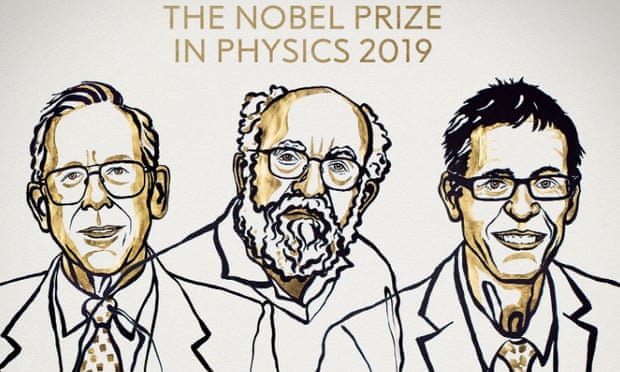James Peebles laid foundation for modern cosmology while Swiss pair found first exoplanet
Source: The Guardian
Three scientists have been awarded the 2019 Nobel prize in physics for groundbreaking discoveries about the evolution of the universe and the Earth’s place within it.
James Peebles, from Canada, has been awarded half of the 9m Swedish kronor (£740,000) prize for his theoretical discoveries about the evolution of the universe. The Swiss astronomers Michel Mayor and Didier Queloz share the other half of the prize for their discovery of the first planet beyond our solar system.
Peebles was rewarded for laying a foundation for modern cosmology, including his realisation that faint microwave radiation that filled the cosmos 400,000 years after the Big Bang contains crucial clues to what the universe looked like at this primitive stage and how it has evolved over the subsequent 13bn years.
Mayor and Queloz have been recognised for their joint discovery in 1995 of the first exoplanet, 50 light years away in the constellation of Pegasus. The planet, 51 Pegasi b, is a gaseous ball about 150 times more massive than Earth and has a scorching surface temperature of about 1,000C.
Queloz, who holds posts at the University of Geneva and the University of Cambridge, told a press briefing at London that he had been expecting a call about a grant he was working on when the news came through.
“I couldn’t think at all, I had a complete blackout because emotionally it was extremely intense,” he said. By mid-afternoon he had not yet managed to get his former supervisor and fellow laureate Mayor on the phone, which he said was “typical Michel”.
The pair discovered the exoplanet using a sophisticated technique known as Doppler spectroscopy, which measures the tiny wobble of a star that occurs as the star-planet pair move around a common centre of gravity. This wobbling movement alternately blueshifts and redshifts the light from the star.
When Queloz and Mayor set up the search it was with low expectations of finding anything because any planets massive enough to create a measurable Doppler shift were expected to have such long orbits that the wobble would take years to detect. Surprisingly, though, they found a huge planet sitting extremely close to its host star, with an orbit of just four days.
“Because it was so near in to its star, no one really believed it,” said Queloz, adding that it took several years to convince the world that the finding was real.
Since then, astronomers having found more than 4,000 exoplanets in an incredible range of sizes, forms and orbits. Learning about these strange and varied worlds beyond our solar system has transformed understanding of how planets formed and given new focus to the question of whether there could be alien life out there somewhere.
Queloz said the sheer numbers of planets made it hard to believe that ours was the only one to host life.
“We may find out that life is extremely rare. We know life is special, but we may not acknowledge how special or rare it is,” he said. “It’s not impossible that in the next 20 to 30 years there will be new kinds of equipment that would be able to answer this question. Whether they will find something is open.”
Peebles is credited with developing the theoretical tools that allowed scientists to perform a cosmic inventory of what the universe is made from, showing that ordinary matter makes up just 5% of its known contents, with the rest being dark matter and dark energy.
“We still must admit that the dark matter and dark energy are mysterious,” Peebles told the Royal Swedish Academy of Sciences on Tuesday. “There are still many open questions … what in the world is this dark matter?”
Looking back over his career spanning half a century, Peebles, who is the Albert Einstein professor emeritus of science at Princeton University, said he had never set out with a grand plan.
“I could think of one or two things to do in cosmology. I just did them and kept going,” he said. “The prizes and awards, they are charming, much appreciated, but that’s not part of your plans. You should enter science because you are fascinated by it.”
Prof Sir Martin Rees, Britain’s astronomer royal, described Peebles as the world’s “most influential and respected leader of empirical cosmology, with a sustained record of achievement spanning half a century.”
He said: “The study of exoplanets is perhaps the most vibrant field of astronomy. We now know that most stars are orbited by retinues of planets. There may be a billion planets in our galaxy resembling the Earth (similar in size and at a distance from their parent star where liquid water can exist). This takes us a step towards the fascinating question of detecting evidence for life on the nearest of these exoplanets.”
On Monday, two Americans, William Kaelin and Gregg Semenza, and Britain’s Peter Ratcliffe won the Nobel prize for physiology or medicine for discovering details of how the body’s cells sense and react to low oxygen levels, providing a foothold for developing new treatments for anaemia, cancer and other diseases.
The winner of the Nobel prize for chemistry will be announced on Wednesday, two literature prizes will be awarded on Thursday, and the peace prize on Friday. This year, two literature prizes will be handed out because last year’s was suspended after a scandal rocked the Swedish Academy.

































Leave a Comment
You must be logged in to post a comment.